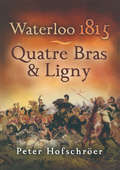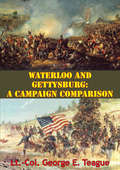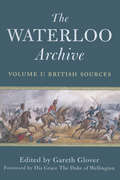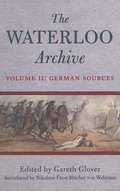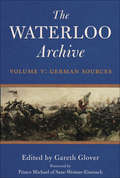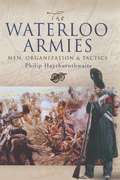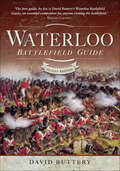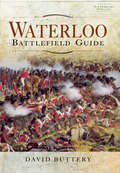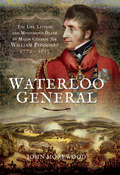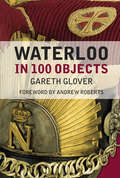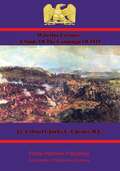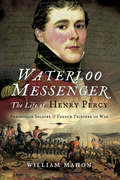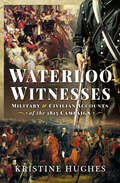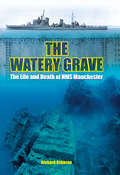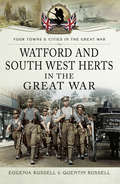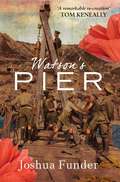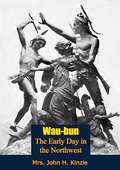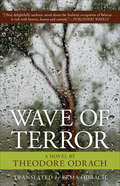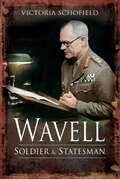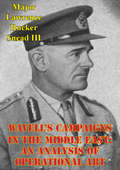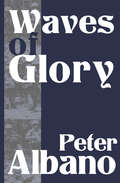- Table View
- List View
Waterloo 1815: Quatre Bras
by Peter HofschröerThe Battle of Waterloo marked the climax of four extraordinary months. Napoleon returned from exile, ousted the unpopular King Louis XVIII, and then turned to launch a pre-emptive strike against the Allied armies assembling in the United Netherlands. Here Napoleon met Wellington who had cobbled together an army with contingents from the British, the United Netherlands and the Prussians, firstly at Quatre Bras and then finally at Waterloo.This is the second book in the series to cover the battle following on from Hougoumont.
Waterloo 1815: Wavre, Plancenoit And The Race To Paris
by Peter HofschröerThe acclaimed historian sheds new light on the Battle of Waterloo and the defeat of Napoleon with a focus on the Prussian Army&’s critical contribution. Histories of the Waterloo campaign that brought an end to the Napoleonic Wars generally concentrate on the battle between the armies of Napoleon Bonaparte and the Duke of Wellington, giving Field Marshal Blücher's Prussian forces only passing attention. But in this fascinating historical analysis of the conflict, Peter Hofschröer provides a full account of the Prussians and their critical but often neglected side of the battle. Hofschröer vividly recounts the grueling Prussian advance towards the battlefield and the ferocious and decisive fight that broke out when they arrived. At every stage, he allows the reader to follow in the footsteps of the Prussian soldiers as they struggled across the Belgian countryside on that fateful day in 1815.
Waterloo 1815
by Geoff WoottenOsprey's study of the most famous battle of the Napoleonic Wars (1799-1815). Waterloo holds a special place among the great battles of history. The climax of more than twenty years of war, it was indeed a close-run affair, matching two of the world's greatest generals - Napoleon and Wellington. This volume covers the entire campaign including the battles of Quatre Bras, Ligny and Wavre, with five full-colour maps and three highly detailed bird's eye views showing decisive moments in the action. An excellent sense of the closeness of the battle is communicated - Wellington himself claimed it was "the nearest thing you ever saw in your life" - and this gripping account shows the full justice of that statement.
Waterloo And Gettysburg: A Campaign Comparison
by Lieutenant-Colonel George E. TeagueIn June of 1815 Napoleon led French forces on an offensive campaign into Belgium against the Allied Anglo-Dutch and Prussian armies under Wellington and Blucher. During this campaign Napoleon and several of his marshals made serious errors that led to missed opportunities for victory and ultimately to defeat at Waterloo. Less than 50 years later Robert E. Lee led Confederate forces on an offensive campaign into Maryland and Pennsylvania against the Union Army under Hooker initially, then Meade. A meeting engagement near Gettysburg, Pennsylvania led to three days of fighting during which Lee and several of his generals made critical errors that allowed opportunities for victory to pass and ultimately led to decisive defeat.These campaigns were remarkably alike in a number of ways. This paper reviews the campaigns and discusses similarities in the strategic settings, campaign objectives, size and disposition of forces, battlefield terrain, tactics employed, and leadership of each army. In particular, the paper compares the performances of selected French and Confederate leaders and how they contributed to the defeat of their respective armies. These comparisons provide valuable lessons learned for the conduct of future military operations.
The Waterloo Archive Volume I: Volume 1: British Sources (The Waterloo Archive #1)
by His Grace the Duke of WellingtonOriginally published in 1900, this book features excerpts from Alexander Cavali Mercer's account of the battle of Waterloo. As an artillery officer at the sharp end, this is his eye-witness account of the events that lead to Napoleon's final defeat in June 1815. This is the contemporary view of how the events were conveyed to the public of Great Britain. Featuring original engravings from the Illustrated London News and the Graphic, and many paintings from the era, this book was written during the height of the British Empire, and the triumphalist mood of the day is reflected in the tone of the text. This detailed military history provides an echo of the contemporary attitudes to this turbulent time which shaped the destiny of the British Empire. This book is part of the 'Military History From Primary Sources' series, a new military history range compiled and edited by Emmy Award winning author and historian Bob Carruthers. The series draws on primary sources and contemporary documents to provide a new insight into the true nature of warfare. The series consultant is David Mcwhinnie, creator of the award winning PBS series 'Battlefield'.
The Waterloo Archive Volume II: German Sources (The Waterloo Archive #2)
by Nikolaus Fürst Blücher von WahlstattHistories of the Waterloo campaign and tours of the battlefield generally concentrate on the battle between the armies of Napoleon and Wellington - the role of Blucher's Prussians is left in the background. Peter Hofscher's fascinating account focuses on the Prussians at the Battle of Waterloo and on their critical but often neglected contribution to the battle. He tells the story of the grueling Prussian advance towards the battlefield and he records the ferocious and decisive fight that broke out when they arrived. At every stage he allows the reader to follow in the footsteps of the Prussian soldiers as they struggled across the Belgian countryside almost 200 years ago.
The Waterloo Archive Volume V: German Sources (The Waterloo Archive #5)
by Prince Michael of Saxe-Weimar-EisenachThe British archives of the Napoleonic wars are unique, brimming with personal letters to family and friends or journals that record their innermost thoughts. The human aspect of war comes to the fore, the humor and exhilaration; the fears and miseries; the starvation and exhaustion; the horror and the joy.It is usually accepted that very few common soldiers of this period could read or write and that the few letters and journals that do exist emanate from more senior officers, who were required to be able to write to perform their duties. Volume I proved this to be a fallacy, and this volume continues with a further three accounts, and shows how the ordinary soldier saw things, giving a different aspect to our studies. Also included:* The poignant final letters of older family men such as Major Arthur Heyland, jar noticeably with the bawdy and carefree scribbles of youth by such as Ensign Kinchant (including describing his visits to bordellos) who also lost his life that day. * A long series of letters by Lieutenant Frederick Johnston of the 6th Inniskillings and of Lieutenant George Blathwayt of the 23rd Light dragoons sheds important light on cavalry regiments who have few previously published memoirs. * A very interesting letter by Second Lieutenant Richard Cocks Eyre of the 2nd Battalion 95th Rifles makes a mockery of the myth that British troops did not openly plunder the local farmhouses before the battle for food and fuel to burn. *A letter by a civilian visitor to the area six weeks after the battle ends this volume, which will engage and fascinate the reader.
The Waterloo Armies: Men, Organization & Tactics
by Philip HaythornthwaiteGerman troops formed the majority of Wellingtons forces present at the Battle of Waterloo including those of Nassau, Brunswick, Hanover and the Kings German Legion, and they have left a large number of first-hand accounts of their role in the battle.The actions of the King's German Legion an integral part of the British Army and partly officered by British soldiers has been published in English, but to a limited degree: Herbert Siborne published letters written to his father; Ompteda and Wheatley have had their memoirs published; and History of the Kings German Legion included a small number of letters, including the oft-misquoted account of the defence of La Haye Sainte by Major Baring. This forms a tiny proportion of the German material available. Therefore it is not surprising that early British histories of the battle have largely sidelined the achievements of the German troops, and this has been regurgitated by most that have followed. This situation did not change until the 1990s when Peter Hofschroer published his two-volume version of the campaign from the German perspective, which included snippets of German documents published in English for the first time. But even this proved not totally satisfactory, as it did not provide the whole document to allow full interpretation. There is a great need to provide an English version of much of the original German source material to redress the imbalance; this volume is intended to remedy that situation by publishing sixty of these reports and letters fully translated into English for the first time, giving a clearer insight into the significant role these troops played. Gareth Glover is a historian specialising in the Waterloo campaign and the Peninsular War. He left school at eighteen to join the Royal Navy as a Seaman Officer and completed his extensive training course at Dartmouth College. He has published articles in The Waterloo Journal and the Journal of the Royal Artillery, and a novel about Waterloo, Voices of Thunder.Christmas Selection 2010, Napoleon.org website
Waterloo Battlefield Guide: Battlefield Guide
by David ButteryMuch of the material available to readers in the English language interested in the exploits of the troops of Hanover, Brunswick and Nassau is in the form of dry official reports, which stick to the basic facts and avoid all sentimentality and emotion. However, unbeknown to virtually anyone in the English-speaking world interested in the more human aspects of these 'foreign' troops fighting alongside the British at Waterloo, there are a number of memoirs and sets of letters, which have been published in Germany over the last two centuries. Until now, these had never been translated into English and so have been inaccessible to the vast majority. This volume seeks to put this right and to bring to life the human story of these German troops their trials and tribulations, their sufferings and their emotions and to finally reveal their views on the battle which many entered with mixed emotions. Highlights include an account of the confusion in the final great advance at Waterloo; eyewitness recollections of the defense of La Haye Sainte; rare battle reports by the Duke of Wellington; and a fascinating series of letters explaining the whereabouts of a number of 'missing' Hanoverian regimental and staff surgeons and subsequent court martials.
Waterloo Battlefield Guide
by David ButteryA British military historian offers an expert introduction to The Battle of Waterloo in this essential companion for battlefield visitors. In Belgium on June 18th, 1915, the Battle of Waterloo marked the climax of the Napoleonic Wars—and a major turning point in world history. The combined forces of the Duke of Wellington and Field Marshal von Blücher delivered a devastating defeat to Napoleon. Though the outcome would have a major influence on the shape of Europe for more than a century, the battle itself cannot be properly understood without a detailed study of the landscape in which it was fought. Using eyewitness accounts and an intimate knowledge of the terrain, historian David Buttery vividly reconstructs the events of Waterloo as he takes readers across the battleground as it exists today. He provides essential context for understanding pivotal episodes in combat, including the day-long struggle for the chateau at Hougoumont, the massive French infantry assaults, repeated cavalry charges, the fall of La Haye Sainte, the violent clashes in the village of Plancenoit, the repulse of the Imperial Guard and rout of the French army.
The Waterloo Campaign in 100 Locations
by John GrehanIn the 200 years since the famous battle in the muddy, bloody fields of Waterloo, almost every aspect of the fighting has been examined and analyzed, apart from one – that of finding and illustrating locations relating to the campaign. From Napoleon’s landing on the Golfe Juan on France’s Côte d’Azur, along the Route Napoleon and through Grenoble, the Emperor’s journey back to Paris, and back to power, is shown in glorious full color. In this beautifully produced book, we see where Napoleon distributed the Imperial Eagles to the regiments of his army, and where his forces assembled before marching to war, and where the Due of Wellington’s Anglo-Allied army gathered in Brussels. The camera follows the initial encounters on the banks of the River Sambre and the maneuvering of the French and Coalition forces leading to the first great battles of the campaign at Quatre Bras and Ligny. The key sites occupied by the opposing armies at these battles are investigated as are the routes of the withdrawal to Mont St Jean by Wellington’s army and to Wavre by Blücher’s Prussians. The Waterloo battlefield and its associated buildings are examined in pictorial detail, as are the locations which marked the pivotal moments of the battle. The sites of the corresponding battle at Wavre are also shown, as well as the pursuit of the two wings of beaten French Army, including the sieges of the fortresses by the British army, before Paris was finally reached. The uprising in the Vendée and the last clashes of the campaign before Napoleon’s abdication are also featured. The book closes with Napoleon’s journey from Paris to St Helena via l'Île d’Aix and Plymouth. Headquarters buildings, observation posts, monuments and memorials, bridges and battlefields, and the principal locations of the campaign are portrayed in unique photographs – and behind every plague and place is a tale of political posturing, military maneuvering, sacrifice and savagery. Together these images tell the story of Napoleon’s greatest gamble, and we know that a picture is worth a thousand words!
Waterloo General: The Life, Letters and Mysterious Death of Major General Sir William Ponsonby, 1772–1815
by John MorewoodThe defeat of Napoleons French army by the combined forces of Wellington and Blcher at Waterloo on 18 June 1815 was a turning point in world history. This was the climax of the Napoleonic Wars, and the outcome had a major influence on the shape of Europe for the next century and beyond. The battle was a milestone, and it cannot be properly understood without a detailed, on-the-ground study of the landscape in which it was fought and that is the purpose of David Butterys new battlefield guide. In vivid detail, using eyewitness accounts and an intimate knowledge of the terrain, he reconstructs Waterloo and he takes the reader and the visitor across the battleground as it is today. He focuses on the pivotal episodes in the fighting the day-long struggle for the chateau at Hougoumont, the massive French infantry assaults, repeated cavalry charges, the fall of La Haye Sainte, the violent clashes in the village of Plancenoit, the repulse of the Imperial Guard and rout of the French army. This thoroughgoing, lucid, easy-to-follow guide will be a fascinating introduction for anyone who seeks to understand what happened on that momentous day, and it will be an essential companion for anyone who explores the battlefield in Belgium.
Waterloo in 100 Objects
by Gareth Glover Andrew RobertsObjects allow us to reach out and touch the past and they play a living role in history today. Through them we can come closer to the reality experienced by the soldiers who fought at Waterloo – that most iconic of all battles. Using stunning photography, rare objects from the Napoleonic era tell us their story of the battle. From the discomfort of the uniforms to the drama of the battle-drums echoing across the battlefield, by examining each object and its place in the Waterloo story, we reach a deeper understanding of what happened on the battlefield and its significance today. Gareth Glover takes us on fascinating journey through 100 objects, from the rare to the memorable, in a unique testimony to importance of the battle of Waterloo, 200 years on.
Waterloo Lectures: A Study Of The Campaign Of 1815
by Lt.-Colonel Charles C. Chesney R.E.This ebook is purpose built and is proof-read and re-type set from the original to provide an outstanding experience of reflowing text for an ebook reader. Waterloo Illustration Pack - 14 maps/battle plans, 18 portraits of the personalities engaged, 10 illustrations. The Waterloo campaign of 1815 was a turning point in world history. After 25 years of almost constant warfare that raged from India to Canada, from South America to the Caribbean, peace among the European powers was decided on a small strip of land in modern day Belgium. The momentous fruits of the campaign have led to the decisions and actions of the belligerents and their armies to be argued back and forth ever since. Colonel Chesney's work is amongst a handful of books that are considered to be "standard" as histories of the campaign that have been translated into French and German. It is fitting that the work of such a learned soldier, who is also a late professor of Military Art and History at the Staff College in Camberley, should be such a balanced and detailed account of the campaign. This ebook is based on the 4th edition which includes all of the changes that Colonel Chesney wished to be incorporated until his untimely death and was published posthumously. Title - Waterloo Lectures: A Study Of The Campaign Of 1815 (4th Edition) Author -- Lt.-Colonel Charles C. Chesney R.E. (1826-1876) Text taken, whole and complete, from the edition published in 1907, London, by Longmans, Green and Co. Original - xiv and 251 pages. Illustrations - The original map cannot be provided with this edition due to its A3 size - We have added our Waterloo Illustration pack to ensure that the reader can follow the text.
Waterloo Messenger: The Life of Henry Percy: Peninsular Soldier & French Prisoner of War
by William MahonAt the Battle of Waterloo Sir William Ponsonby, a man who the Duke of Wellington stated had rendered very brilliant and important services and was an ornament to his profession, was killed by French lancers after leading the Union Brigade (the three Dragoon Regiments of the Royals, Iniskillings and Scots Greys) in a charge that wrecked a French advance that threatened Wellington with defeat. Sir William was a career soldier who had led his regiment in the decisive charge at the Battle of Salamanca and served with great distinction during the Peninsular War. Yet historians have blamed him because the charge at Waterloo got out of hand. In this book John Morewood uses family sources, including Sir Williams letters, as well as French and German accounts, to restore his reputation and, by shedding new light on the battle, establishes what really happen to him on that fatal afternoon. It is also a biography of a man whose bravery and professionalism distinguished him as one of the outstanding cavalry commanders of the age.
Waterloo Station: A Novel
by Emily GraysonThese were days of uncertainty and peril, of noble deeds and great sacrifice.An exciting time to be young and adventurous . . . but a dangerous time to fall in love.
Waterloo Witnesses: Military and Civilian Accounts of the 1815 Campaign
by Kristine HughesThe events of Sunday, 18 June, stand as the defining moment of the year 1815, if not of an entire era. The allied victory over Napoleon’s French army at the Battle of Waterloo reshaped governments and boundaries, made or broke fortunes and touched thousands of lives in ways both large and small, and it has been analysed, dissected and refought on paper a hundred times. Perhaps, though, the very best words ever written about that momentous campaign are the first-person accounts recorded as events unfolded. It is these vivid accounts that Kristine Hughes has collected together in order to convey the hopes, fears and aspirations of their authors. They inject the story of the battle with a level of humanity that reclaims it from the realm of legend and restores it to the people who witnessed it. In chronological order her work pieces together a novel view of the battle and events surrounding it as they were experienced by both military men and civilians. The result is a fascinating and varied picture of the individuals involved and the society of the period. Their words make compelling reading.
The Watery Grave: The Life and Death of HMS Manchester
by Richard OsborneIn 2002 the wreck of a British cruiser was located by divers off the coast of Tunisia. The stunning photographs of the wreck inspired Dr Richard Osborne to delve into the controversy surrounding the loss of one of the Royal Navy's proudest ships HMS Manchester. After taking part in the Norway campaign of 1940, Manchester was sent to the Mediterranean, where she was involved in the dangerous Malta convoys. On her first convoy she was struck by a torpedo and badly damaged. In danger of sinking at any minute, her skipper, Captain Harold Drew, managed to save his ship.Her next operation was to prove her last. In Operation Pedestal, the vital Malta relief convoy, Manchester was again hit by a torpedo. This time, rather than risk the lives of his crew Drew decided to scuttle his ship. For this Drew was court-martialled in what would become the longest such case in the history of the Royal Navy.Using the testimony of those involved, the highly respected naval historian Dr Osborne pieces together one of the most intriguing stories to emerge from the Second World War. Coupled with photographs of the wreck and a detailed account of its discovery, The Watery Grave: The Life and Death of HMS Manchester, will shed new light on this remarkable tale.
Watford and South West Herts in the Great War (Your Towns & Cities in the Great War)
by Eugenia Russell Quentin RussellThis book highlights the importance of Watford as a regional centre within South West Herts during the years of the Great War as well as the cohesion of the local area and the impact events and initiatives had on the entire region. The organization and presence of the Army are discussed before focusing on different aspects of civilian life such as the contribution of civilians to the war effort, the Police and Fire Service, the role of Churches, Schools and the Press and changes in employment and local businesses. As the War wore on and the magnitude of the sacrifice sunk in, hospitals and charities became more prominent. The latter part of the book presents these as well as the many public and private ways of commemorating the War Dead in the aftermath of the conflict. The distinctiveness of such Memorials reflects the legacy of the Arts and Crafts Movement and the artistic communities resident in Bushey and Watford.
Watson's Pier
by Joshua FunderOn 20 December 1977, as Stanley Watson takes the slow train journey to family Christmas, memories from over 60 years ago play in his mind. He had been and still was a man of his time, as as steady, simple and direct as the railway lines he built. As an engineer in the 28th Signalling Company, recently wed and with a young child, he knew it to be his duty to enlist as soon as war broke out in 1914. He left for Egypt in October and he knows his wife is pregnant as he reaches Gallipoli on 25 April 1915, a participant in that fateful landing that is writ large in Australian history. He survived that landing to construct the first pier at Anzac Cove, from which the Anzacs withdrew on the nights of 18 and 19 December. For a long time, he was known as the last man to leave Gallipoli. Watson's Pier is a beautifully told story as seen through the eyes of Stanley Watson, one of the leaders of the escape from Gallipoli. It draws on Watson's story, his writing, oral history and the official war records. While telling one man's remarkable experience of war for the first time, Watson's Pier challenges history on the final moments at ANZAC Cove and offers a new perspective on the meaning of Gallipoli.
Wau-bun, The Early Day in the Northwest: The Early Day In The Northwest
by Mrs John H. Kinzie Dr Louise Phelps KelloggOriginally published in 1856, and then edited (with notes and introduction) by Louise Phelps Kellogg and republished in 1930, there is no better description of early Chicago and the famous Fort Dearborn Massacre to be found anywhere than that contained in Wau-bun, The Early Day in the Northwest.Among the familiar characters who come into the story are Governor James D. Doty, Jefferson Davis, John Lowe, Col. Wm. S. Hamilton, son of Alexander Hamilton, Eleazar Williams, Augustin Grignon, Jacques Porlier, Chief Four Legs, and many others.The garrison life at Forts Howard and Winnebago, the dangerous passage of the rapids of the Fox River in the Mackinac boats, and the customs of the Wisconsin Indians of the period are all vividly told in this classic.Unmissable American historical literature.“Mrs. Kinzie’s account of the early day in Wisconsin is delightful; it sparkles with humor and with the pleasure of youth in new and strange adventures. The spirit of happiness pervades it and the author’s affectionate sympathy for her husband’s Indian ‘children’ shines on every page. Her description of travel and its vicissitudes in Wisconsin of the early day is full of fun and jollity. She was what we would call today a ‘good sport,’ taking everything with philosophy and good will. The feast of good things is spread for the reader; all that remains is enjoyment of the narration.”—Louise Phelps Kellogg, Introduction
Wave of Terror: A Novel
by Theodore OdrachThis novel is a major literary discovery, and Odrach is drawing favorable comparisons with such eminent writers as Chekhov and Solzhenitsyn. Odrach wrote in Ukrainian, while living an exile's life in Toronto. This remarkable book is a microcosm of Soviet history, and Odrach provides a first-hand account of events during the Stalinist era that newsreels never covered. It has special value as a sensitive and realistic portrait of the times, while capturing the internal drama of the characters with psychological concision. Odrach creates a powerful and moving picture, and manages to show what life was really like under the brutal dictatorship of Stalin, and brings cataclysmic events of history to a human scale.
Wavell: Soldier and Statesman
by Victoria SchofieldArchibald Wavells life and career makes a marvelous subject. Not only did he reach the highest rank (Field Marshal) and become an Earl and Viceroy of India but his character was complex. He joined the Black Watch in 1901. He stood out during the Great War, quickly earning the Military Cross but losing an eye. He was at Versailles in 1918 but between the Wars his career advanced with Brigade and General commands notably in Palestine where he spotted Orde Wingate. By the outbreak of war he was GOC-in-C Middle East. Early successes against the Italians turned into costly failures in Greece and Crete and Wavell lost the confidence of Churchill; their temperaments differed completely. Wavell was sent to India as C-in-C. After Pearl Harbor Wavell was made Supreme Allied Commander for the SW Pacific and bore responsibility for the humiliating loss of Singapore (he quickly recognized that it could not be held). Problems in Burma tested Churchills patience and he was removed from command to be Viceroy and Governor General of India. As civil unrest and demands for independence grew, in 1947 Prime Minister Attlee replaced Wavell with Mountbatten who oversaw Partition. Wavell died in 1950, after a life of huge achievement tempered with many reverses, most of which were not of his making.
Wavell's Campaigns In The Middle East: An Analysis Of Operational Art
by Major Lawrence Rucker Snead IIIToday the United States confronts an uncertain world. The strategic environment has changed. It no longer has one main enemy and a military force to confront that foe. Instead, the United States must be prepared to deal with a multiple of possible threats as its military continues to downsize. This new regional orientation and world situation requires that the US Military be ready to fight simultaneous major regional contingencies to achieve the victories that the American people expect.Therefore, this study examines Field Marshall Wavell's campaigns in the Middle East in WWII to provide a historical case study of a similar situation. There he had to simultaneously conduct a large number of campaigns and operations over four theaters of operations against different enemies under difficult conditions to achieve strategic objectives. It compares this case study with the current strategic military requirements facing the US and current US Military doctrine to determine if the US is prepared to deal with multiple simultaneous regional contingencies.Finally, this monograph indicates that the US Military needs to update both its National Military Strategy and it's doctrine in order to be prepared to fight and win multiple simultaneous major regional contingencies in the future. In addition, this study has indicated a number of implications for the conduct of operational art by the US Military.
Waves of Glory
by Peter AlbanoWaves of Glory follows four British men of privilege watching the decimation of their generation in the trenches of the World War I battlefields. As the soldiers try to cope with the blood, violence, and death all around them, their world falls apart and nothing seems real except the overwhelming urgency of survival. The home front is no less compelling, as Albano illustrates the pain and uncertainty of waiting for the daily casualty lists that might include a brother, father, lover, or husband. The emotional energy of the men, the women they love, and their comrades in arms brings home the lessons that were arduously learned yet quickly forgotten in the &“war to end all wars.&”
